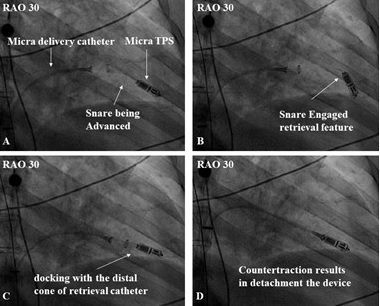TRANSCATHETER RETRIEVAL OF THE CHRONICALLY IMPLNATED LEADLESS TINES-BASED PACEMAKER SYSTEM
Background: There are no detailed studies regarding the safety and feasibility of retrieving and replacing a chronically implanted Micra TPS.
Methods: Study included 9 patients, mean Ø age 61±12,6 y. (2 F) with MICRA implanted between September 2014 and January 2019. Via the right femoral vein accessed using the 23 Fr (ID) sheath the original delivery catheter system for implanting Micra TPS was adapted for index retrieval procedure. An intracardiac echocardiography (ICE) catheter was advanced. Single-loop 7 mm snare wire was inserted through the central lumen of the TPS delivery catheter. The system’s distal cone was maneuvered into the RV to the proximal aspect of the device and the snare was advanced around the proximal retrieval feature of the TPS. After confirming coaxial alignment between the snare and the retrieval feature with multi-plane fluoroscopy, the snare was closed and locked around the retrieval feature. Countertraction force from the distal cone, to release the tines from the myocardium, thereby allowing withdrawal of the device into the distal cone. The delivery catheter and Micra TPS were then withdrawn into the introducer sheath and safely removed.
Results: After an implantation duration of 1.076 ± 864 (92 – 3.301) days, the overall retrieval success rate was 88.9% (8 of 9 patients). The mean procedure time was 89 ± 16 minutes, fluoroscopy time during the retrieval procedure was 17.6 ± 9.3 min. No procedure-related adverse device events occurred. In the single patient with unsuccessful retrieval, intracardiac echocardiography revealed that the Micra TPS was embedded within the cardiac wall and surrounding tissue. After retrieval, four patients received a new Micra TPS. All reimplantations were successful with proper electrical parameters recorded.
Conclusions: Late retrieval of an implanted Micra TPS was safe and feasible.
